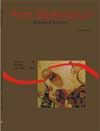<b>Periphytic algae response to temperature changes and artificial nutrient enrichment</b> - DOI: 10.4025/actascibiolsci.v31i3.1627
Keywords:
periphytic algae, artificial enrichment, temperature, abundance, floodplain
Abstract
This study set out to evaluate, via a mesocosm experiment, the influence of the temperature and concentration of nutrients (N and P) in the abundance of periphytic algae (except Bacillariophyceae) of the upper Paraná river floodplain. The experiment was designed using 5 treatments: a control (C), added nutrients (P+, N+, NP+) at 25°C, and without added nutrients at 15°C. Glass slides were used for periphytic algae colonization, and the samples were taken on the 15th and 31st days following colonization. Canonical Correspondence Analysis revealed a clear separation among treatment groups due to temperature and added nutrients. A decrease in temperature affected the abundance of periphytic algae classes, especially in the reduction of the relative density of Cyanophyceae and increase in Zygnemaphyceae. The artificial addition of nutrients – especially P – altered the structure of the periphytic algae communities. The relative densities of the classes, in general, increased with the addition of nutrients. Phosphorus may be considered a driver of periphytic algae, as can be seen by the rapid response after artificial enrichment.Downloads
Download data is not yet available.
Published
2009-07-01
How to Cite
Murakami, E. A., & Rodrigues, L. (2009). <b>Periphytic algae response to temperature changes and artificial nutrient enrichment</b> - DOI: 10.4025/actascibiolsci.v31i3.1627. Acta Scientiarum. Biological Sciences, 31(3), 273-284. https://doi.org/10.4025/actascibiolsci.v31i3.1627
Issue
Section
Ecology and Limnology
DECLARATION OF ORIGINALITY AND COPYRIGHTS
I Declare that current article is original and has not been submitted for publication, in part or in whole, to any other national or international journal.
The copyrights belong exclusively to the authors. Published content is licensed under Creative Commons Attribution 4.0 (CC BY 4.0) guidelines, which allows sharing (copy and distribution of the material in any medium or format) and adaptation (remix, transform, and build upon the material) for any purpose, even commercially, under the terms of attribution.
Read this link for further information on how to use CC BY 4.0 properly.
0.6
2019CiteScore
31st percentile
Powered by 

0.6
2019CiteScore
31st percentile
Powered by 












1.png)




3.png)













